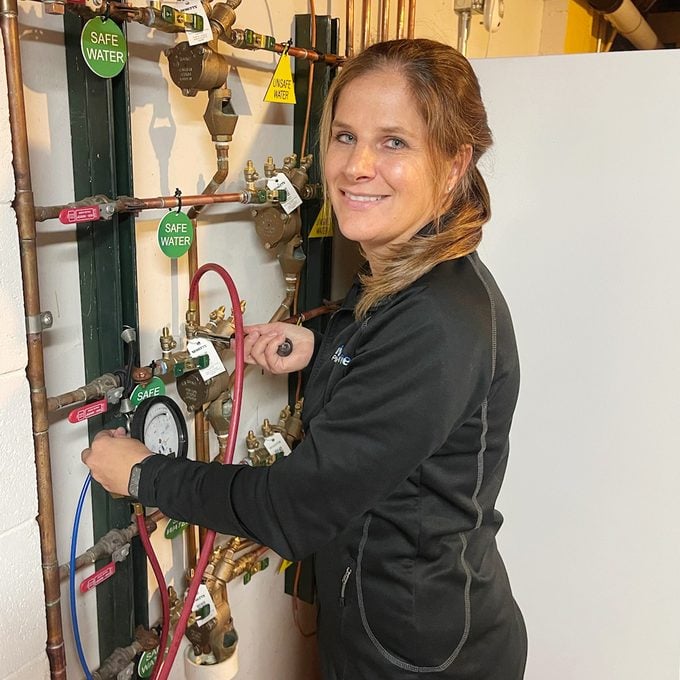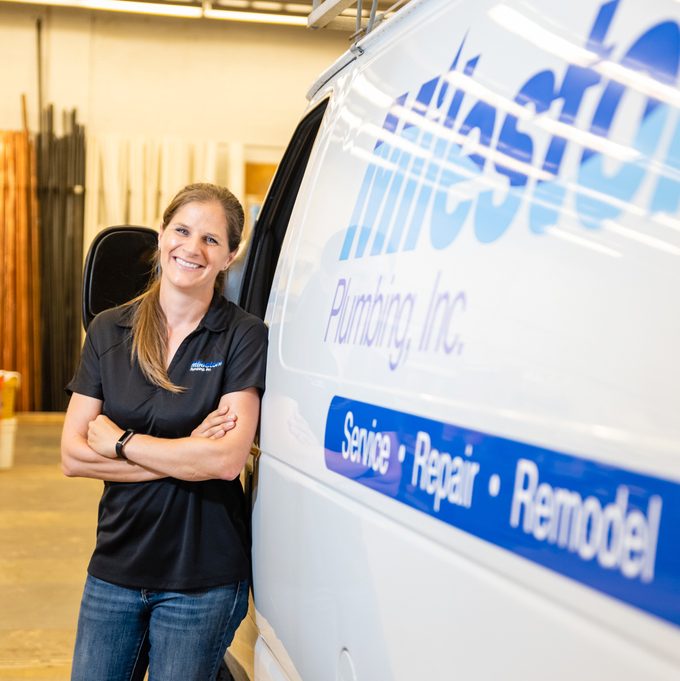

This FH series introduces readers to a few of the women who make up 11 percent of the construction workforce in the U.S., spotlighting stories of their careers in the field. Know someone we should feature? Email us here.
Though Jessie Cannizzaro grew up helping her dad with the family plumbing business, she had no intention of following in his footsteps. Instead, she set her sights on college. After initially studying to be a veterinarian, she shifted into business. Then her dad had a stroke, so she stepped in to help out. Soon, she rediscovered her passion for plumbing.
“I decided I wanted to be in plumbing forever,” she says. “And one of the cool things is, I was able to take my business degree, marry it with apprenticeship training, and eventually get my license to start my own business. So it all came together incredibly well.”
In 2011 she launched Milestone Plumbing, based in Wauwatosa, Wisconsin, which specializes in residential remodels and repairs. Besides supervising 16 employees, she advocates for multiple organizations that encourage high school students to enter the trades. She also created a coloring book to introduce elementary-aged kids to the joys of being a plumber.
We recently asked Cannizzaro for her thoughts on the state of the plumbing business.
On This Page
Q: First off, let’s hear about your plumbing coloring book.
A: It tells the story of a young girl who’s inspired to become a plumber and features all my team members. I’m currently the only woman on it, but I have a dream that someday that will change, and maybe this coloring book can help have that impact on our community.
We pass it out at schools, customer’s homes and other job sites where there are kids. It was a super fun project for us to create, and we hope it will help kids realize that the trades are for all people. If something interests you, like plumbing, or carpentry, or HVAC, you can go explore it to see if it’s what you want to do.
Research is coming out that many kids decide before high school what they want to go into. I see this as a way to try to positively impact our community, help provide a solid future for kids and get more women in the trades.
Q: How has your experience of working in the plumbing business evolved?
A: In the beginning, I made my company name very nondescript and I went by Jess, so people would assume I was a man, or at least not immediately identify me as a woman. I figured if a potential customer didn’t trust having a female plumber, it still gave me the opportunity to get my foot in the door to show them that I’m a licensed tradesperson and I do know what I’m talking about.
But it turned out that there wasn’t pushback from prospective clients. Instead, communities throughout our area have really embraced us and the business has thrived.
Q: Share a success that stands out for you.

A: I love when we get involved in projects that nobody else can figure out. I love having a puzzle and a challenge.
For example, there was a condo project downtown in Milwaukee that had special wall-outlet toilets that had to be installed in a certain way. Other plumbers had told the contractor that it couldn’t be done. We ended up working with Kohler’s engineering team on modifying the design to give the contractor what they wanted. We landed the job, and today that’s one of our biggest clients.
Q: What are some interesting changes in the plumbing industry?
A: New technologies have been huge. Now you can shut your water off at the meter with your smartphone. There are also digital showers that let you tell them features to turn on and off.
During the pandemic, with the crazy toilet paper shortage, people started getting really interested in bidets. It’s a cool thing to have, and now we sell them all the time.
Also, materials have changed a lot. Back in the old days, they used to have cast-iron pipe, a lot of galvanized pipes that needed threading and concrete laundry tubs. Today we’re using PVC and fiberglass laundry tubs, which are much lighter, so one plumber can carry them and do jobs safely without a second set of hands.
Q: What’s your advice for young people wanting to get into the trades?
A: You can read about it and watch videos, but until you’re involved in physically doing it, there’s no way to know if it’s for you.
Get some firsthand experience by shadowing at companies in different trades to learn what a day in the life is like. Most companies are more than willing to have you ride along. I tell our shadows to also try commercial projects, because the experience of a plumber on a big hospital project is very different than that of a residential plumber on a repair job.
It’s worth investing the time to explore and find what you love to do — your passion — because I meet so many adults who hate what they do every day. They wish they would have gone into a different career.
Also, people don’t always realize that some employers will pay for you to go to school. You’re literally sitting in class making an hourly wage to learn a trade. And then you get a great-paying career that’s incredibly rewarding, with no college debt.
Q: What’s your advice for other business owners who want to advocate for the trades?

A: It’s great to have a business. But if we all strictly just focus on our day jobs and don’t look to improve our communities, we don’t really move the needle.
If you love the trades, find a school you can help sponsor and mentor the kids. For example, we’re working with a local high school that’s building a powder room/bathroom setup involving different trades. We’re working with suppliers to get them project materials and also showing students how we run the drain and vent for the toilet and lavatory sink, as well as the water piping and installing the fixtures.
Projects like this helps introduce kids to the plumbing trade and change the culture, to get the trades more widely accepted.
Q: What’s in your tool bag?
A: We heavily support Milwaukee Tool. We think that they make the best tools.
Our team gets to try out prototypes and sometimes reps come watch us use their tools in the field. It’s cool to be a part of the new technology coming through the pipeline. It’s also a testament that the company is literally out in the field seeing how we’re using things.
I love their flashlights, and their tripod LED lights are amazing. Their copper cutter is my favorite tool for a very personal reason.
When I was an apprentice I was doing a lot of re-pipes and the motion of manually cutting copper started to give me painful issues with my wrist. A doctor gave me braces that I had to wear at night because my wrists were locking up so bad. But the way the Milwaukee Tool Cutter cuts the copper eliminated that strain.
I also like Milwaukee Tool and ChannelLock brand smaller channel locks, because I can throw them in my back pocket whenever I go into a house. Milwaukee also makes a great Pex tool.
Jessie Cannizzaro Bio
Jessie Cannizzaro grew up helping her dad at his plumbing company, where she learned to solder at age 7. After earning undergraduate and graduate business degrees at the University of Wisconsin-Milwaukee, she returned to plumbing when her father fell ill.
In 2011 she started Milestone Plumbing in her Wauwatosa basement and garage, then moved it to the same location where her dad’s plumbing company had been. Recently she found to a larger location to accommodate her growing team.
Writer Karuna Eberl Bio
Karuna Eberl is a regular contributor to FamilyHandyman.com. She spent the last 25 years as a freelance journalist and filmmaker, telling stories of people, nature, travel, science and history. Eberl has won numerous awards for her writing, her Florida Keys Travel Guide and her documentary The Guerrero Project.
Did you miss our previous article…
https://tophouseimprovement.com/how-to/how-homeowners-can-reduce-climate-risk/

